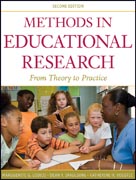
Methods in educational research: from theory to practice
Lodico, Marguerite G.
Spaulding, Dean T.
Voegtle, Katherine H.
Written for students, educators, and researchers, Methods in Educational Research offers a refreshing introduction to the principles of educational research. Designed for the real world of educational research, the book’s approach focuses on the types of problems likely to be encountered in professional experiences. Reflecting the importance of The No Child Left Behind Act, “scientifically based” educational research, school accountability, and professional demands of the twenty-first century, this resource empowers educational researchers to conduct research in their classrooms, districts, and the greater educational community - activities now not only expected but required of all teachers. Marguerite G. Lodico, EdD, is a professor at the College of Saint Rose where she teaches child development and educational research. Dean T. Spaulding, PhD, is an associate professor at the College of Saint Rose where he teaches educational research and program evaluation. Katherine H. Voegtle, PhD, is a professor at the College of Saint Rose where she teaches courses in human development, educational research, and educational psychology. INDICE: List of Boxes, Exhibits, Figures, and Tables. Preface. Acknowledgments. About the Authors. 1. Introduction to Educational Research. Chapter Objectives. Educational Accountability and Educational Research. Conducting Educational Research. Philosophical Frameworks for Educational Research. Research Ethics. Summary. Key Concepts. Discussion Questions or Activities. Suggested Readings. 2. Types of Educational Research Designs and Related Major Concepts. Chapter Objectives. Types of Approaches Used in Educational Research. Summary. Key Concepts. Discussion Questions or Activities. Suggested Readings. 3. Descriptive Statistics. Chapter Objectives. Characteristics of Data. Summarizing Data Using Descriptive Statistics. Summary. Key Concepts. Discussion Questions orActivities. Suggested Readings. 4. Educational Measurement: Archival Data andStandardized Instruments. Chapter Objectives. Measurement in Education. Evaluating the Quality of Standardized Instruments: Reliability and Validity. Issues in Finding and Using Standardized Instruments. Summary. Key Concepts. Discussion Questions or Activities. Suggested Readings. 5. Qualitative Measures and Procedures. Chapter Objectives. Characteristics of Qualitative Measurement. Sampling in Qualitative Research. Summary. Key Concepts. Discussion Questions orActivities. Suggested Readings. 6. Qualitative Research. Chapter Objectives. Research Vignette. Understanding Qualitative Research. Steps in Designing Qualitative Research. Evaluating Narrative Inquiry and Phenomenological Research. Summary. Key Concepts. Discussion Questions or Activities. Samples of Qualitative Research Studies. Suggested Readings. 7. Organization and Analysis of Qualitative Data. Chapter Objectives. Analysis of Qualitative Data. Steps in Analyzing Qualitative Data. Summary. Key Concepts. Discussion Questions or Activities. Suggested Readings. 8. Descriptive Survey Research: Quantitative Research.Chapter Objectives. Research Vignette. Characteristics of Descriptive Survey Research. Steps in Designing Descriptive Survey Research. Evaluating Descriptive Survey Research. Summary. Key Concepts. Discussion Questions and Activities. Samples of Descriptive Research Studies. Suggested Readings. 9. ExperimentalResearch. Chapter Objectives. Research Vignette. Understanding Experimental Research. Steps in Planning and Conducting Experimental Research. Threats to Experimental Validity. Single-Subject Research Designs. Summary. Key Concepts. Discussion Questions or Activities. Sample Group Experimental Studies. Suggested Readings. 10. Nonexperimental Approaches: Causal-Comparative and Correlational Research. Chapter Objectives. Research Vignette. Causal-Comparative Research. Correlational Research. Multiple Regression Studies. Summary. Key Concepts.Discussion Questions or Activities. Sample Causal-Comparative Study. Sample Correlational Studies. Suggested readings. 11. Inferential Statistics. Chapter Objectives. Beyond Descriptive Statistics: Inferential Statistics. Steps in Analyzing Data Using Inferential Tests. Designs With More Than One Independent or Dependent Variable. Summary. Key Concepts. Discussion Questions or Activities. Suggested Readings. 12. Action Research. Chapter Objectives. Research Vignette. Understanding Action Research. Steps in Conducting Action Research. Data Sources for Action Research. Evaluation of Action Research. Summary. Key Concepts. Discussion Questions or Activities. Sample Action Research Studies. Suggested Readings. 13. Program Evaluation in Education. Chapter Objectives. Research Vignette. What Is Program Evaluation? Types, Approaches, and Models of Program Evaluation. Steps in Designing Program Evaluation. Program Evaluation Dataand Critiquing Evaluation Reports. Training and Careers in Program Evaluation. Summary. Key Concepts. Discussion Questions and Activities. Sample Program Evaluations. Suggested readings. 14. Identifying and Researching a Topic. Chapter Objectives. Getting Started. Identify a Research Topic. Refine Your Topic as You Search. Search the Literature. Identify and Summarize Key Information From Articles. When Do I Have Enough? Summary. Key Concepts. Discussion Questions or Activities. Suggested Readings. 15. The Research Proposal. Chapter Objectives. Preparing a Research Proposal. Why Write a Research Proposal? Anatomy ofa Research Proposal. Summary. Key Concepts. Discussion Questions or Activities. Suggested Readings. References. Appendix A. Appendix B.
- ISBN: 978-0-470-43680-6
- Editorial: Jossey Bass
- Encuadernacion: Rústica
- Páginas: 516
- Fecha Publicación: 30/03/2010
- Nº Volúmenes: 1
- Idioma: Inglés
